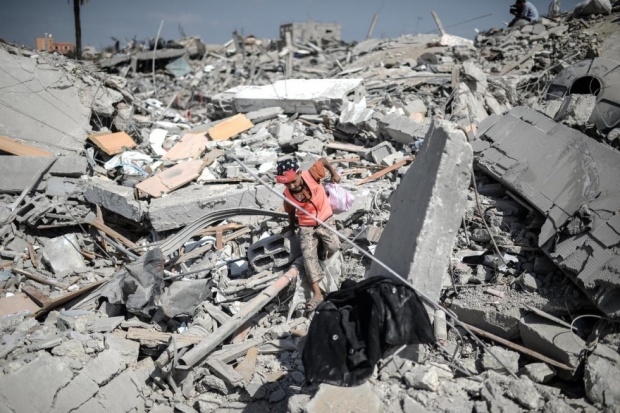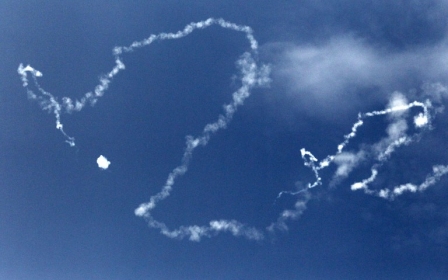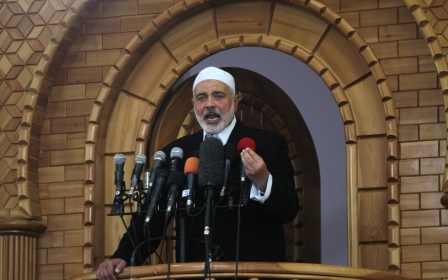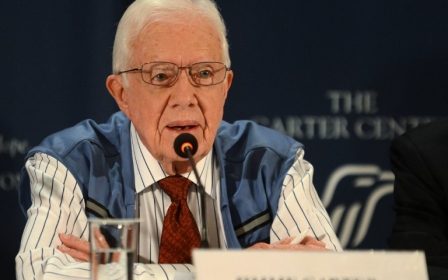Hamas and Israel not in talks over a truce: source

Hamas is not talking to Israel about a long-term hudna or truce, either directly or indirectly, a senior Palestinian source told MEE.
The original claim about negotiations was made by Ahmed Yousef, a political adviser to Ismail Haniyeh, the Hamas leader in Gaza, who said that indirect “chats” were taking place with Israel through European mediation over a long-term hudna.
Yousef had told Palestinian Maan News Agency last month that: “We await the formation of an Israeli government so things can get more serious. European diplomats and civil society activists come to the Gaza Strip constantly and pose Israeli viewpoints and convey the reaction of the movement through unofficial chats.”
However, the Palestinian source told MEE: “There are no ‘chats’ with Israel. Some international players are increasingly convinced that Gaza should not be left without a solution and it seems even Israel may have an interest in defusing the timebomb. And in this atmosphere there are thoughts among the European players, but there are no ‘chats’.”
Efforts to implement the deal struck between Hamas and Fatah over a unity government last year have also run into the ground, although the source argued that Palestinian unity remains the centrepiece of Hamas’s political strategy.
The former US president Jimmy Carter went to Saudi Arabia in March to seek its involvement in getting talks going between Palestinian President Mahmood Abbas and Hamas. Before Riyadh started work, Saudi Arabia sought a letter of commitment to the forthcoming negotiations from both Hamas and Fatah. Hamas sent that letter, but MEE was told one from Abbas has yet to arrive.
Despite this, the source believes Hamas remains optimistic that the dynamics of the standoff over Gaza will change.
“There are three factors that open a window which would allow for a positive advance. These would include [Egyptian President Abdel Fattah al] Sisi and others in the reconciliation attempt,” the Palestinian official said.
“Firstly, Hamas is powerful on the ground. Neither Abbas, nor even Israel, can break Hamas or bypass it. Secondly, keeping Gaza as it is is a double-edged sword. Stopping Hamas also means creating a timebomb in Gaza that will explode, and this is why we are seeing efforts exerted to solve the problem. Third, there is a deep change in Saudi Arabia and that is changing the rules of the game. Maybe Saudi Arabia can mediate. It seems the Saudis are restoring their leadership stand throughout the Arab world after [launching the military campaign in Yemen dubbed] Decisive Storm. [Riyadh] might be able to play a leadership role on issues, among them the Palestinian issue, without pushing Egypt out of the game.”
However, all efforts to keep criticism of the Palestinian president private have been abandoned and he is now identified as a “problem all by himself” to a reconciliation deal.
He criticised Hamas publicly for drawing Gaza into a war with Israel and – according to the Palestinian official – has, since the end of the war last summer, done everything to keep all measures against Gaza in place, including stopping payments to civil servants, keeping the blockade and stopping reconstruction.
The salaries of Hamas government workers in Gaza remain unpaid since June last year. In October the unity government’s Ministry of Social Affairs allowed through a donation from Qatar that resulted in 24,000 Hamas workers getting $1,200 each. Since then, no one has been paid, and Ramallah has been accused of refusing to let subsequent donations from Qatar through.
“He [Abbas] wanted Hamas to be weakened and the people of Gaza to turn against Hamas,” the Palestinian official said. “Day by day, Abbas is becoming a problem, a problem all by himself. Sisi does not want reconciliation either. He does not want Hamas to have new legitimacy. He wants a reconciliation with (Mohammed) Dahlan instead.”
According to the source, Hamas is determined to stick to its policy of reconciliation, even though, in its eyes, there is no one to deal with it.
Having withstood a blockade lasting at least nine years (and some believe the siege started in 2001 when Israel cancelled the general exit permit that allowed most Palestinians to move freely through Israel and the Occupied Palestinian Territories), Hamas believes that Gaza can take ten more years without breaking.
The official said: “There is no solution whatsoever for the Palestinian issue without Hamas and nobody can exclude Hamas from building a new political system. Our solution and the only solution to solve the internal problem is the ballot box. Our Palestinian system with the PA and the PLO at every level should be solved by elections and this is the only solution, at whatever level PNA, PNC, for all our problems. This is the solution on the level of domestic politics the only solution that will end the conflict, finish the crisis in Palestine, and the only way of getting rid of the occupation. There is no solution to this dilemma other than solving the problem of Gaza and lifting the blockade.”
Attempts to stitch together a working relationship with Fatah is further complicated by the re-emergence of a former aid, now rival, to Abbas’s leadership in his twilight years, the exiled Dahlan.
Dahlan, who previously headed Gaza’s Preventive Security Service (PSS), in the 1990s was forced to leave Gaza in 2008 for the West Bank, although he has since had a tumultuous relationship with Ramallah. He was exiled in 2010 after he was linked to a plot to overthrow Abbas but has since re-emerged on the scene as the provider of unlimited Emirati funds, recently financing mass weddings in Gaza and the West Bank.
Abbas and Dahlan have previously accused each other of corruption, and the decision last month by the corruption court in Ramallah to dismiss charges against Dahlan due to him having immunity as a PLC member is said to have “greatly upset” the Palestinian president.
Regardless, some claim that Fatah and Dahlan are working hand in glove to unseat Hamas in Gaza.
“Dahlan wants to restore his national image by giving aid to the people of Gaza. He sees this as compensation, a reward for being in the game with Fatah now,” the official said.
New MEE newsletter: Jerusalem Dispatch
Sign up to get the latest insights and analysis on Israel-Palestine, alongside Turkey Unpacked and other MEE newsletters
Middle East Eye delivers independent and unrivalled coverage and analysis of the Middle East, North Africa and beyond. To learn more about republishing this content and the associated fees, please fill out this form. More about MEE can be found here.




